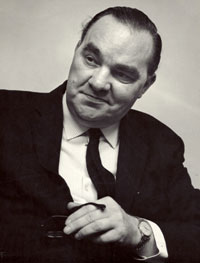Gwyn Thomas (novelist)
| Gwyn Thomas | |
|---|---|
 |
|
| Born |
6 July 1913 Cymmer, Porth, Rhondda Valley |
| Died | 13 April 1981 (aged 67) University Hospital of Wales, Cardiff |
| Occupation | School teacher |
| Nationality | Welsh |
| Alma mater | University of Oxford, University of Madrid |
| Period | 1930s–1970s |
| Genre | Short stories, Radio plays, Novels, Plays |
| Spouse | Lyn (née Williams) |
Gwyn Thomas (6 July 1913 – 13 April 1981) was a Welsh writer, dramatist, Punch-columnist, radio broadcaster and raconteur, who has been called "the true voice of the English-speaking valleys".
Gwyn Thomas was born in Cymmer, Porth in the Rhondda Valley, the youngest of 12 children, to coalminer Walter Morgan Thomas and his wife. His mother died when he was aged six, and he was consequently brought up by his sister, often with handouts from the local soup kitchen.
After winning a scholarship, Thomas studied Spanish at the University of Oxford. Plagued by mysterious health problems, terribly poor and depressed, it was only after spending a summer and a term at the end of his second year at Complutense University of Madrid, thanks to a miners' scholarship, that he decided to complete his studies. Thomas was diagnosed at the age of 23 with a previously undetected thyroid malfunction that had been poisoning him for years, which was operated on to prevent his death.
On graduation, and wanting to be a writer, Thomas struggled to establish himself during the 1930s depression. He took on part-time lecturing jobs across England, while trying to get his novel Sorrow For Thy Sons published.
He married his childhood friend Eiluned (Lyn) Thomas in Pontypridd Register Office on 5 January 1938. Failing to pass the British Army medical at the outbreak of World War II thanks to 20 years of smoking, he returned to Wales in 1940 and taught at the WEA. He then became a schoolteacher, first teaching French in Cardigan, and then Spanish at Barry Grammar School for 20 years. At Barry Gwyn was a wonderfully motivating teacher. Aside from his Spanish language teaching he was probably best known for his talks on American humourists and then, annually, for his adjudication of Eisteddfod competitions where, shaking like a leaf, his considered judgements would leave the audience almost hysterical with laughter but, equally, much the wiser.
...
Wikipedia
